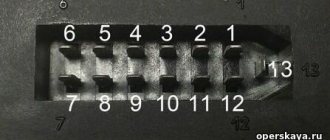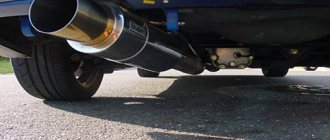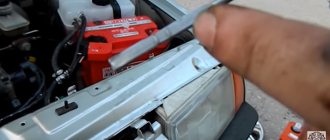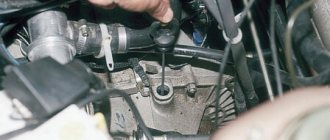There may be several reasons associated with a burning smell in a car that we may not yet know. For example, this smell occurs when two surfaces rub against each other. In some situations, you may be able to fix this yourself. Otherwise, we recommend immediately using the services of the nearest car service center. But how to distinguish each case?
Burnt smell from clutch
The clutch is a car part that operates under conditions of constant and intense friction. The clutch is subject to constant load, both when the car starts moving and when the engine runs at high speeds.
One of the reasons for the burning smell may be the clutch, for example, in the process of slipping. The source of the smell may be the friction linings of the clutch disc. The smell will be reminiscent of burnt paper because... Friction linings are a paper-based composite material.
Don’t panic right away; this only means that during friction the friction linings have heated up and oxidized a little. Over time, they will recover and the clutch will still work for a very long time. Complete wear of the clutch is not accompanied by a burning smell. The main thing is not to let the engine run for a long time at high speeds (for example, slipping or prolonged acceleration in a low gear) and then the clutch of your car will last a long time.
Reason #2. Excessive engine oil consumption
Often complaints about the smell of burnt oil are chaotic. Symptoms usually appear after running the engine at high speeds and disappear over time. Usually in this case the reason is not an oil leak, but the release of crankcase gases. And the goal here is just to find a siphoning place.
At high speeds, any engine wastes oil. In addition, the pressure of crankcase and exhaust gases increases. Under these conditions, standard systems work to the limit and gases are looking for additional places to escape. A poor-quality, loosely compressed or old gasket will not resist pressure, causing gases to enter the engine compartment, and from there into the interior.
This situation may well happen to both key seals of engine parts and the exhaust system. For example, a poorly sealed joint between the resonator and the catalyst. Or a loose ring between the muffler and the resonator.
Brakes as a cause of burning smell
Your brake pads can also be the cause of a burning smell in your car. This usually happens when you brake hard and for a long time. During a long descent down a steep hill, you drove on the brakes, and the brake pads overheated. This is not scary, but we still advise you to learn how to brake with your engine.
If a burning smell appears during normal driving, it is most likely due to one of the brake pistons pressing the brake pad against the disc. Also look, maybe you didn’t take the car off the handbrake? If you touch the rims with your hand, the hotter one is the source of the stench. In this situation, it is better to take your car to a car service center.
Check the breather for oil leakage
An unpleasant odor of oil may also appear due to a clogged breather, inspect the breather itself and the hose that comes from it; perhaps at some point where the hoses connect, you will see oil leaks
The breather in the engine is a special device for equalizing the pressure in a sealed container relative to atmospheric pressure, this is what it looks like in the photo
It is also possible for engine oil to leak and burn through car oil seals; as a rule, such a problem is more difficult to see
Our article about the possible causes of burnt oil odors in the car interior has come to an end; we have tried to indicate and describe the most common places for oil leaks in a car, as a result of which an unpleasant odor occurs in the car interior. If you have anything to add or share, we are waiting for your comments and description below under this post.
We recommend articles on this topic:
- Pets can be transported in the cabin or in the hold.
- The benefits of olive oil
- Buying quality oil
- Japanese Idemitsu oils for gasoline engines
- Traffic police and traffic police cars. Part 2
- Traffic police and traffic police cars. Part 1
- Cars with special signals: how to behave when meeting them?
- Unexpected luxury: which cars were hit...
- Cheat sheet for drivers: weed out bad cars by...
- In St. Petersburg, out-of-town cars began to be stolen
- In Naberezhnye Chelny, cars simply fall under...
- Quilting machines.
- Official document for purchasing a car
- List of the best interior upgrade parts...
- What is special about choosing car seat covers?
Electrical wiring smell
The cause of this burning smell may be a short circuit in the electrical circuit of your car. Insulation, plastic coating on wires, fuses or other connections can cause odor.
The solution to this problem is quite simple. All you need to do is fix your car's electrical system to avoid serious problems. Be sure to turn off the engine and evacuate to the nearest professional car service for computer diagnostics and immediately identify all electrical problems.
Smell from heater or air conditioner fan
Check for debris inside the stove. If you haven't used the stove for a long time, dust may have accumulated. But if the burning smell still appears in the car even after using the heater regularly, then there may be some debris in the vent.
People often find plastic bags or other items stuck in the engine, which can cause a burning smell. However, it is possible that the heater itself is damaged and antifreeze is leaking into the vents. It may also cause an odor. To make matters worse, part of the heater may be broken or melted. If the smell gets stronger and you don't find any debris stuck on the fan, head to a garage immediately.
Option 1 - white smoke, smell of diesel fuel
Experienced diesel drivers know that the smell of completely burnt diesel fuel is no different from the exhaust fumes of a gasoline car - and certainly no more annoying.
If the smell of diesel fuel in the exhaust is felt particularly intensely, as when refueling, for example, and is also accompanied by dense white smoke, this is a signal for the owner. Plumes of white smoke and the dense “aroma” of diesel fuel mean that the fuel in the cylinders does not have time to burn completely. Unburnt diesel fuel residues enter the exhaust system and begin to evaporate there - hence the “fogginess” and the smell.
This option may be the norm if it happens on an early frosty morning or the problem is solved a couple of minutes after the start of warming up. In these cases, as the engine heats up, the combustion chamber also reaches operating temperature, the mixture ignites from compression more efficiently and burns completely.
Burnt oil smell
Burnt motor oil can be very dangerous. This is one of the most common causes of a burning smell in a car. This means you have an oil leak. This often results in oil getting into the exhaust pipe. The pipe is hot while the car is running and we get a strong smell and blue smoke from the exhaust pipe.
Diagnostics is necessary, inspect the space around the motor. You will probably notice oil stains - a clear sign of an oil leak. Contact a car service center immediately, otherwise this may result in engine failure or fire.
REMEMBER: You can always contact our car service center, where your car will be happy to receive professional technical assistance. You can also make an appointment with us for a scheduled technical inspection! Please familiarize yourself with our car repair and diagnostic services.
The smell of burnt oil in the cabin is one of the most common problems for motorists. Moreover, it is important to note that this unpleasant problem occurs both among owners of budget cars and among owners of expensive models. It’s definitely not possible to drown out the unpleasant aroma and thus get rid of the problem. The root of the problem may be hidden behind serious violations in the car, which can lead to large waste and huge losses of time (car downtime) in the future. The situation is further aggravated by the fact that burnt oil is dangerous to the human body. It is definitely not recommended to delay repairs under the current circumstances. We will try to accurately understand the causes of the violation and determine possible ways of developing the problem.
Burnt cardboard
Such odors may indicate a worn clutch disc. Modern cars have the option of automatically adjusting this unit. If, despite this, the smell persists, then this is already a reason to seek professional help. In the case of older cars, under such circumstances, you need to be prepared to replace not only the disc, but also the clutch basket.
To more accurately diagnose the problem, you can perform the following steps:
- accelerate to a speed of 60 km/h;
- engage fourth gear;
- sharply press the accelerator pedal;
- monitor the devices.
If, as a result of such manipulations, the engine speed increases sharply against the background of a roaring engine, and the car continues to move smoothly without increasing speed, then this is a clear sign that you need to contact a repair shop to replace the clutch disc.
Determining the cause: where is the source of the problem?
Before starting to determine the reasons for the appearance of an unpleasant oil smell in the cabin, the driver needs to accurately remember the list of repair work carried out the day before. In many situations, this malfunction is provoked by the following factors:
- Topping up technical fluids;
- Replacement of parts and assemblies;
- Repair of individual components.
The vehicle owner must carry out a visual inspection of all connections and elements, and also pay close attention to the moment when it is most pronounced and under what conditions. It is quite possible that the problem lies in the occurrence of cracks and chips (as a result of holes) due to which oil simply leaks. Among other things, the driver should also make sure that the oil level in the transmission and engine is kept within the limits and does not exceed the recommended values for it.
Strong smell of gasoline
If there is a smell of fuel inside the cabin for a long time, this is an alarming signal. It is quite easy to smell such smells. It is unacceptable to ignore them. If such signs occur, it is recommended to stop, turn off the engine, and try to identify the location of the fuel leak as quickly as possible. Otherwise there is a risk of fire.
You need to pay special attention to the following places:
- fuel line under the bottom of the car;
- tank surfaces and connections;
- engine compartment under the hood;
- injector or carburetor, all connections of hoses and pipes;
- pipeline surfaces;
- gas tank cap, absorber;
- fuel pump, its gasket.
In addition, the car interior can become filled with gasoline fumes due to gloves that were used during refueling and then placed inside the door pocket.
The most dangerous are leaks inside the engine compartment. There are high temperatures and a risk of sparking. Under such circumstances, the possibility of a fuel fire seems quite realistic.
Engine as the source of the problem
In most cases, car drivers, when a burning smell appears inside, complain about problems associated with the transmission. However, as practice shows, the root cause of such a turn of events may be malfunctions directly in the engine. Among the possible options, the most common are:
- Presence of oil on the engine body;
- Lack of oil in the crankcase;
- Valve cover gasket burnout;
- Seal leakage;
- Breather clogged.
Oil may also appear on the engine housing due to inaccurate filling. Over time, it begins to burn and intensely release an unpleasant smell of smoke into the car interior. Under normal conditions, the oil burns completely within 5-6 days and the disgusting aroma immediately disappears. If this does not happen, most likely the problem is more serious.
What is oil responsible for?
The main task of the oil is to lubricate the interacting parts of the engine. A dry combination of these components can lead to overheating and rapid wear.
Engine oil begins its journey in the crankcase. The capacity of the sump depends on the specific engine model. After the engine starts, the oil pump sucks oil through the line and delivers it to the oil filter, which cleans it of impurities. Oil from the filter is supplied to the oil supply channels. It then passes through the interacting elements and returns to the oil pan.











